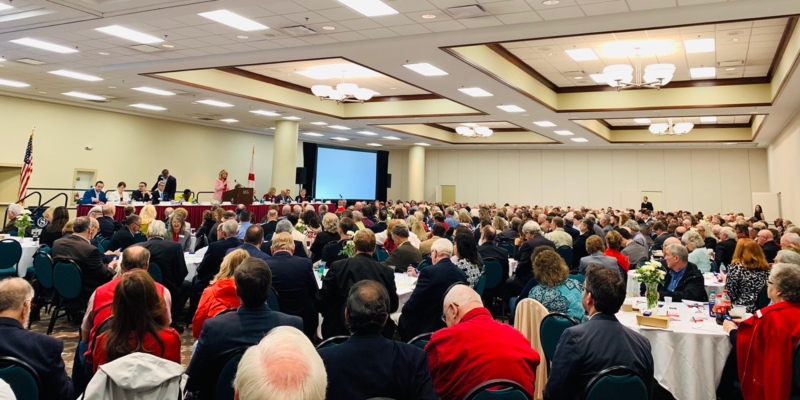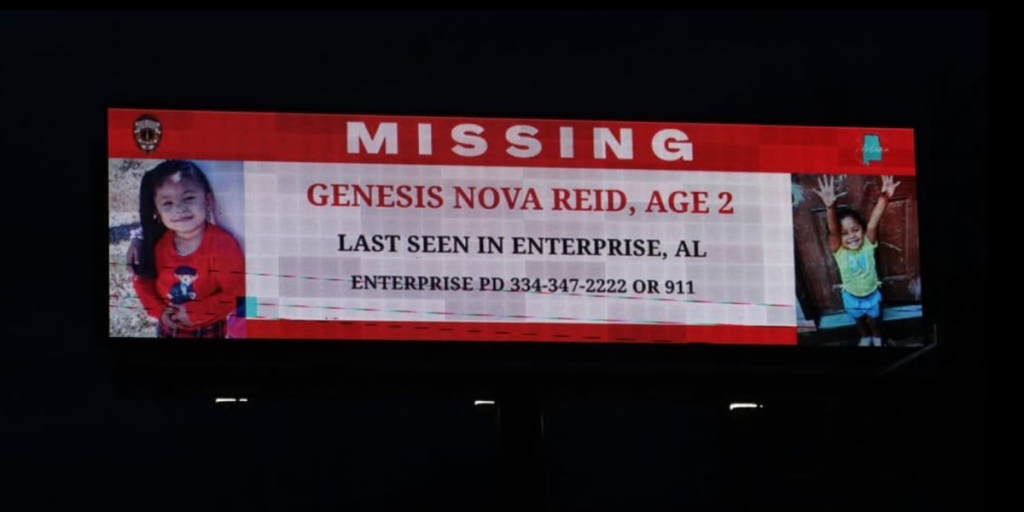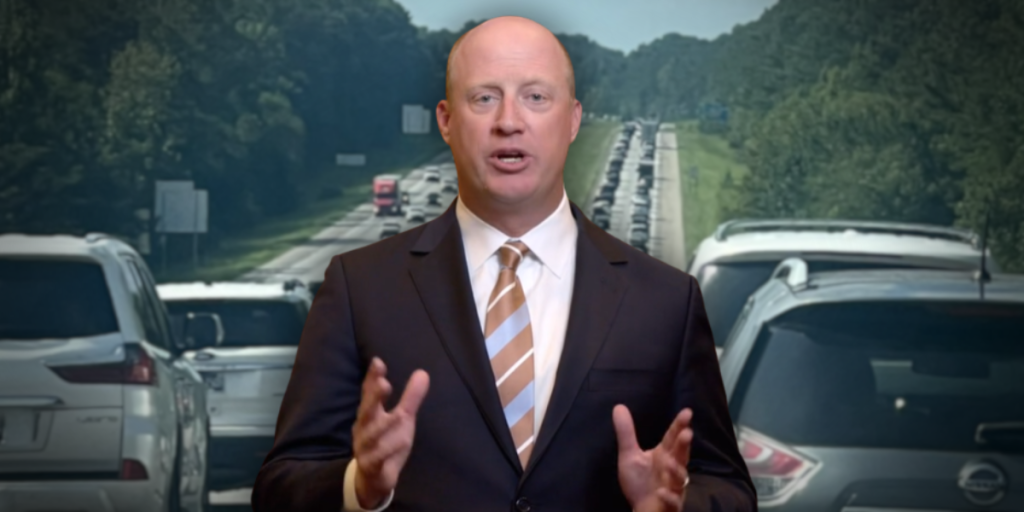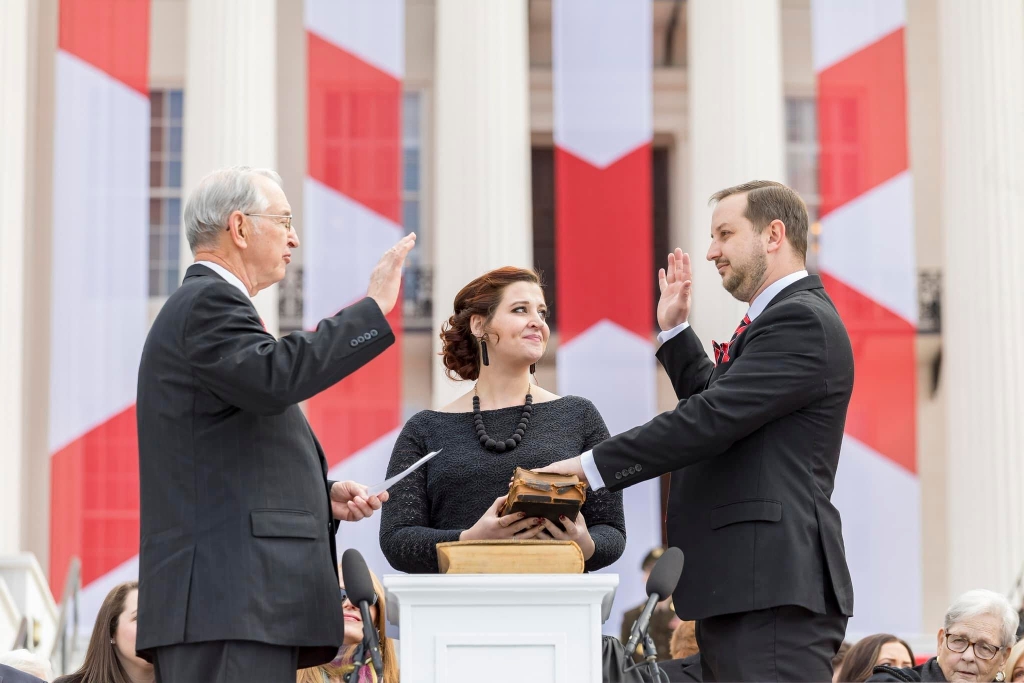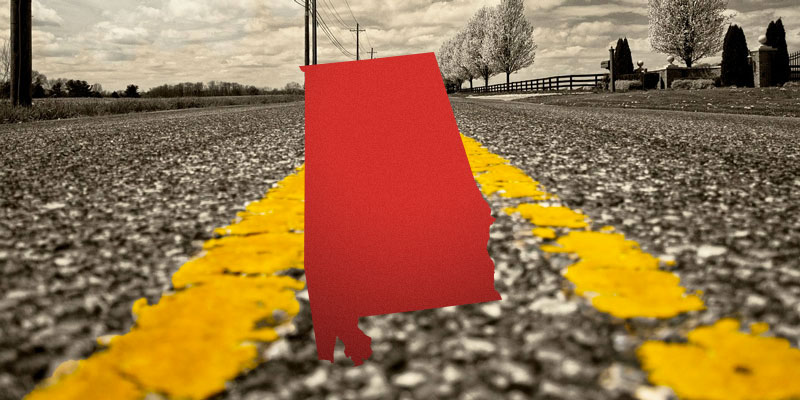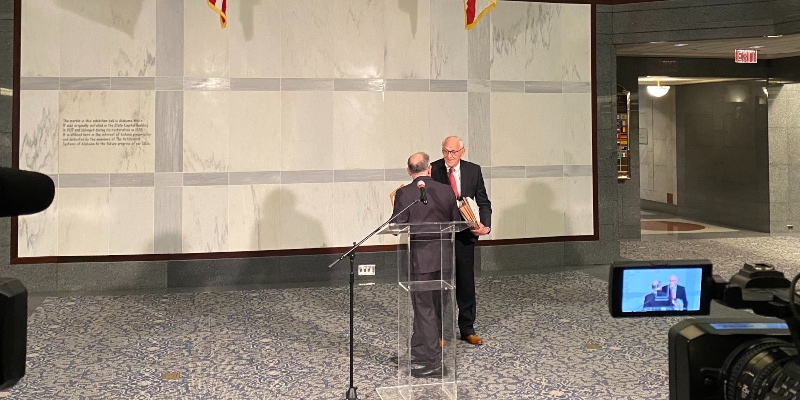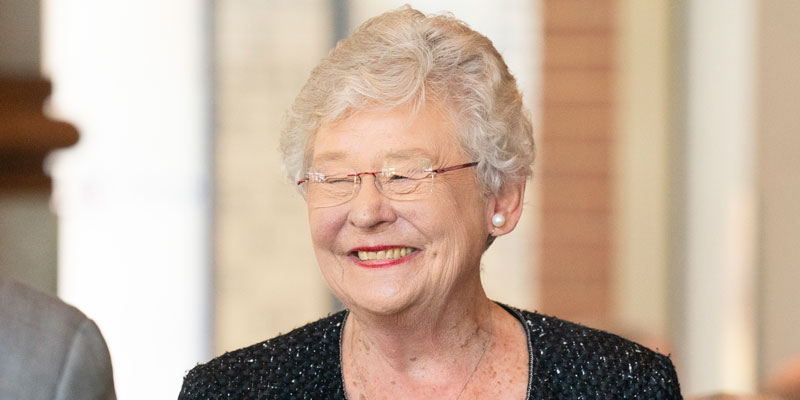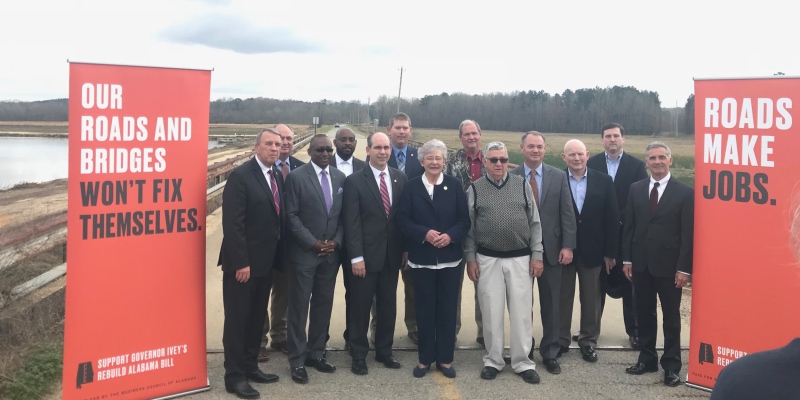BIRMINGHAM — After a harmonious slate of officer elections Saturday, the Alabama Republican Party’s annual winter state executive committee meeting got heated.
The festivities came to a head when a resolution authored by Morgan County’s Tom Fredricks was brought to the floor. The resolution, aimed at the upcoming state legislative session that begins March 5, concluded that the party “reject[s] any increase to the current state fuel tax.”
However, that is not the conclusion Fredricks wanted people to reach. In fact, he told Yellowhammer News Friday night that he supports Alabama Policy Institute’s position on the gas tax, which explicitly says, “It is possible to be a conservative and still debate an increase in taxes.”
When it comes to his own resolution, Fredricks said, “The intent is to hold the level of cumulative taxation [at 8.7 percent].”
API’s proposal lays out a pathway to a revenue neutral gas tax increase that is premised on finding offsetting tax decreases elsewhere.
Former state Senator Trip Pittman (R-Montrose) had worked with Fredricks to reword his original resolution to better fit the author’s intended result, but Fredricks the day before the meeting scrapped the substitute version the two had agreed to and reverted back to the original.
This led to shouting matches between members of the party’s executive committee Saturday, with many people worried that the resolution as presented was not worded in a constructive way.
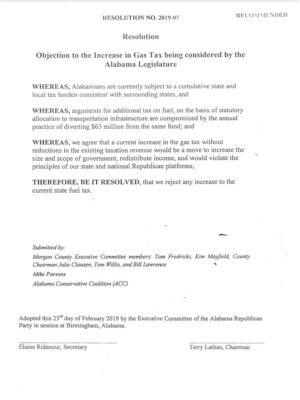
For example, in contrast to the version that reached the floor, the substitute resolution concluded, “THEREFORE, BE IT RESOLVED, that we reject any increase in the current state fuel tax that is not met with an equal reduction elsewhere in existing state revenue and that does not prevent an increase in the ratio of per capita cumulative state and local tax burden to average income.”
After a lot of back and forth and confusion over what was actually being debated (you can read the live-tweet thread here), the Alabama Republican Party executive committee voted to adopt Fredricks’ original resolution.
Fredericks’ resolution has passed 61-39%.
Process was a mess. Pittman not happy that agreed-to substitute was scrapped at the last minute in favor of the original resolution, which contradicts itself and the author’s stated intent.#ALGOPinBhm #alpolitics https://t.co/ec5BbS17ti
— Sean Ross (@sean_yhn) February 23, 2019
Dial Time
In an interview with Yellowhammer News after the proceedings, executive committee member and former state Senator Gerald Dial (R-Lineville) said that he wanted his fellow state executive committee members to trust the governor and the legislators that they helped elect. Dial unsuccessfully tried to substitute Fredricks’ resolution for something expressing just that on the floor.
“We elected them – a supermajority – and the governor ran on that platform. She told everybody, ‘I’m for fixing infrastructure.’ Now we’re telling the governor, ‘Hey, you can fix infrastructure but if you do you’re going to have to let 2,000 prisoners out, you’re going to have to take 200 troopers off the roads, you’re going to have to do away with a lot of the programs that you’ve got out there that the people demand. If you’re going to raise taxes over here, then you’ve got to take it off somewhere else,’” he outlined.
Dial added, “So, I don’t think these people – these people are just hollering, ‘I don’t want taxes.’ They don’t understand: this is a user fee. If you ride a bicycle, you don’t pay a gas tax. If you drive two miles to work, you don’t pay as much as you do if I drive 20 miles.”
“I voted for the tax increase in [1992], and if it wasn’t for that, these people would’ve come down here [to Birmingham] on mud. Most of ’em wouldn’t have gotten here if we hadn’t had that increase,” he said.
Dial lamented a lack of awareness that a large portion of gas tax revenues in Alabama is paid by people from outside of the state just traveling through the Yellowhammer State.
“Twenty-five percent of the people who will pay that tax are out-of-staters,” he explained. “Speaker McCutcheon and I two years ago did statewide roundabout public hearings. We went from Mobile to Dothan to Huntsville to Birmingham and such and we heard the complaints, we heard the industry, we heard the people tell us that the number two thing you look at when you come to a state to do site selection is infrastructure. Workforce is one, infrastructure is two. And [some state party members] just want to throw it to the bottom. But, the legislature will work through it.”
The former state senator also spoke about Trump’s support of raising the gas tax to fund infrastructure improvements. While the state party talked at length about proudly supporting the president during the annual winter dinner on Friday and the meeting on Saturday, Dial saw the state party’s vote on Fredricks’ resolution as opposition to Trump and his policy.
“And the other thing, if we don’t do something, we will not have the state money to match the federal money [that could be made available by the Trump Administration for infrastructure],” he warned. “It’ll go to New York and California, and we won’t get our federal tax dollars back.”
Pittman – “You can’t just say no”
In an interview with Yellowhammer News after Fredricks’ resolution passed, Pittman also emphasized that taxing gas is a user fee.
He mentioned that he and Fredricks view API’s proposal as a good model of what they could support – something that does indeed raise the state gas tax in order to improve infrastructure investments but is offset by tax cuts elsewhere so as to not increase the tax burden on the average Alabamian.
“I think that there is a move afoot that Tom [Fredricks] and I were trying to work on, that API’s doing… and I think that’s what needed to be [put to a vote of the state executive committee],” Pittman outlined. “In the legislature, it’s awful hard when the party sits there and talks about how they just elected a supermajority and how strong they are, then you have to govern. Governing means you have to make tough choices and tough decisions. You can’t just say no.”
Asked why that compromise – a framework or guidelines similar to what API proposed – did not make it to the floor as a substitute to Fredricks’ original resolution as they had agreed to, Pittman responded, “I think that there were powers that be, just people that wanted to draw a hardline position.”
“The fact is that there is a reasonable suggestion in both of these resolutions that says, ‘Hey, if we’re going to increase one, then we’re going to make it revenue neutral,” he said.
Pittman stressed that even in the version of the resolution that ended up passing, the intent was to convey they do not want “an overall increase in the tax burden.” Given this intent, which was put into words in the “whereas” portions of the now-passed resolution, Pittman sees enough wiggle room for legislators to operate and still pass a gas tax increase without going against the ALGOP.
“I think that even though the press is probably going to pick up that the Republican Party objected to the increase, what they really said is that, ‘No increase without an equal reduction somewhere else.’ The press a lot of time just wants to stir debate – what actually passed still leaves the flexibility for the legislature to relocate revenue streams,” he explained.
Pittman specifically pointed to the “regressive” grocery tax as something that could be trimmed, which was suggested in API’s proposal. Pittman also spoke to the fact that gas tax money goes into the general fund while most grocery tax revenue goes into the education trust fund.
“The education budget’s in pretty good shape,” he advised. “They’ve got these surpluses, so there’s a legitimate argument about reducing the grocery tax a little bit, putting it in infrastructure. Which will then increase trafficability, which is an economic improvement, increase safety, save peoples’ lives. You put a lot of people to work…the aggregate – the sand, the asphalt, the equipment – and the people would be a great economic impact – you get income tax, more income tax, more revenue from that. When you improve roads, you improve trafficability, which improves economic activity… so I think the argument can be made if the education budget were to give up a little bit, then they would also – and also because they are flush.”
State Rep. Bill Poole (R-Tuscaloosa), who is slated to carry the infrastructure bill in the legislature, is chairman of the Ways and Means Education Committee. This committee has jurisdiction over the education trust fund in the House.
Sean Ross is a staff writer for Yellowhammer News. You can follow him on Twitter @sean_yhn




